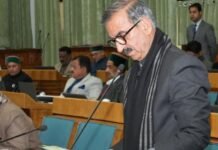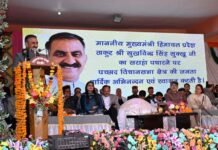In a significant legal and financial breakthrough, the Himachal Pradesh government has secured a landmark verdict from the Supreme Court of India that will ensure greater revenue for the state from one of its largest hydroelectric assets—the 1045 MW Karcham-Wangtu project operated by JSW Energy. With the apex court ruling in favour of the state, the royalty payable to Himachal Pradesh from the project has now been increased from 12 percent to 18 percent, translating into an estimated additional income of ₹150 crore annually and potentially over ₹250 crore as similar arrangements come into effect for other projects.
This historic judgment not only marks a decisive moment in the state’s assertion over its natural resources but also underscores the determined leadership of Chief Minister Thakur Sukhvinder Singh Sukhu. By taking a firm stance and pursuing the case all the way to the Supreme Court, the state government has reaffirmed its commitment to protecting the economic interests of Himachal Pradesh and ensuring that its citizens benefit directly from the region’s abundant hydroelectric potential.
The Karcham-Wangtu hydroelectric project, located on the Satluj River, has been operational since September 2011. As per the original agreement signed in 1999 between the state government and JSW Energy, the company was required to pay 12 percent royalty for the first 12 years and then increase the rate to 18 percent for the remaining 28 years of the 40-year contract. However, when the 12-year period concluded in September 2023, JSW refused to raise the royalty rate, triggering a legal dispute.
The Himachal Pradesh High Court had initially ruled in favour of the company in May 2024, allowing it to continue paying only 12 percent royalty. Unwilling to accept the decision, the state government challenged the ruling in the Supreme Court. The matter was taken up with utmost seriousness at the highest level, with Chief Minister Sukhu personally monitoring the case and appointing some of the country’s top legal minds to argue on behalf of the state.
Senior advocates Kapil Sibal and Prag Tripathi, along with Advocate General Anoop Kumar Rattan and Additional Advocate General Baibhav Srivastava, represented Himachal Pradesh in the Supreme Court. Their compelling legal arguments, backed by a clear reading of the original contractual terms, led to a decisive ruling in favour of the state, restoring the rightful share of royalties as originally envisaged.
A government spokesperson hailed the verdict as a major victory for Himachal Pradesh, both in terms of legal justice and fiscal empowerment. The Supreme Court’s decision is expected to have far-reaching implications for similar hydroelectric projects operating under long-term royalty agreements. Several such projects are now crossing the 12-year threshold, and the verdict is expected to add more than ₹250 crore annually to the state exchequer when other developers begin paying the increased rate.
Chief Minister Sukhu has made resource ownership and fiscal federalism central themes of his administration. Speaking after the verdict, officials close to the matter reiterated that the government would continue to fight for the state’s rights in all sectors, especially where natural resources and public assets are involved. The Chief Minister believes that the people of Himachal Pradesh must benefit from the natural wealth that defines their land.
This latest victory also builds on another legal success for the state—securing the ownership and management rights of the iconic Hotel Wild Flower Hall in a separate dispute with a private hospitality group. That property, tied up in legal battles since 2002, has now returned to state control, further strengthening Himachal Pradesh’s financial position through potential tourism revenues.
Both cases signify a broader shift in governance under the current administration, which is taking a resolute approach to reclaiming state assets and ensuring that public resources serve public welfare. In the case of hydroelectric power—one of Himachal Pradesh’s greatest natural endowments—this assertiveness comes at a crucial time, as the state also pushes forward with green energy reforms and sustainable development initiatives.
As the broader national discourse evolves around energy security, equitable revenue-sharing, and federal autonomy, Himachal Pradesh’s Supreme Court victory may serve as a template for other states that seek to assert their rights over local resources. The ruling reaffirms a simple but powerful idea—that the natural wealth of a state must directly contribute to the prosperity of its people.
#HimachalRoyaltiesVictory #KarchamWangtuVerdict #JSWEnergy #SupremeCourtIndia #HimachalPradesh #GreenEnergy #RevenueJustice #SukhvinderSinghSukhu #IndianHydropower #StateResourcesRights
This is an auto web-generated news story.





